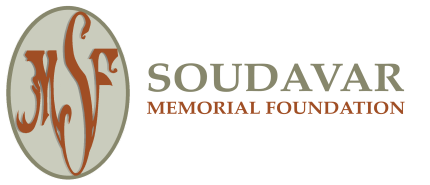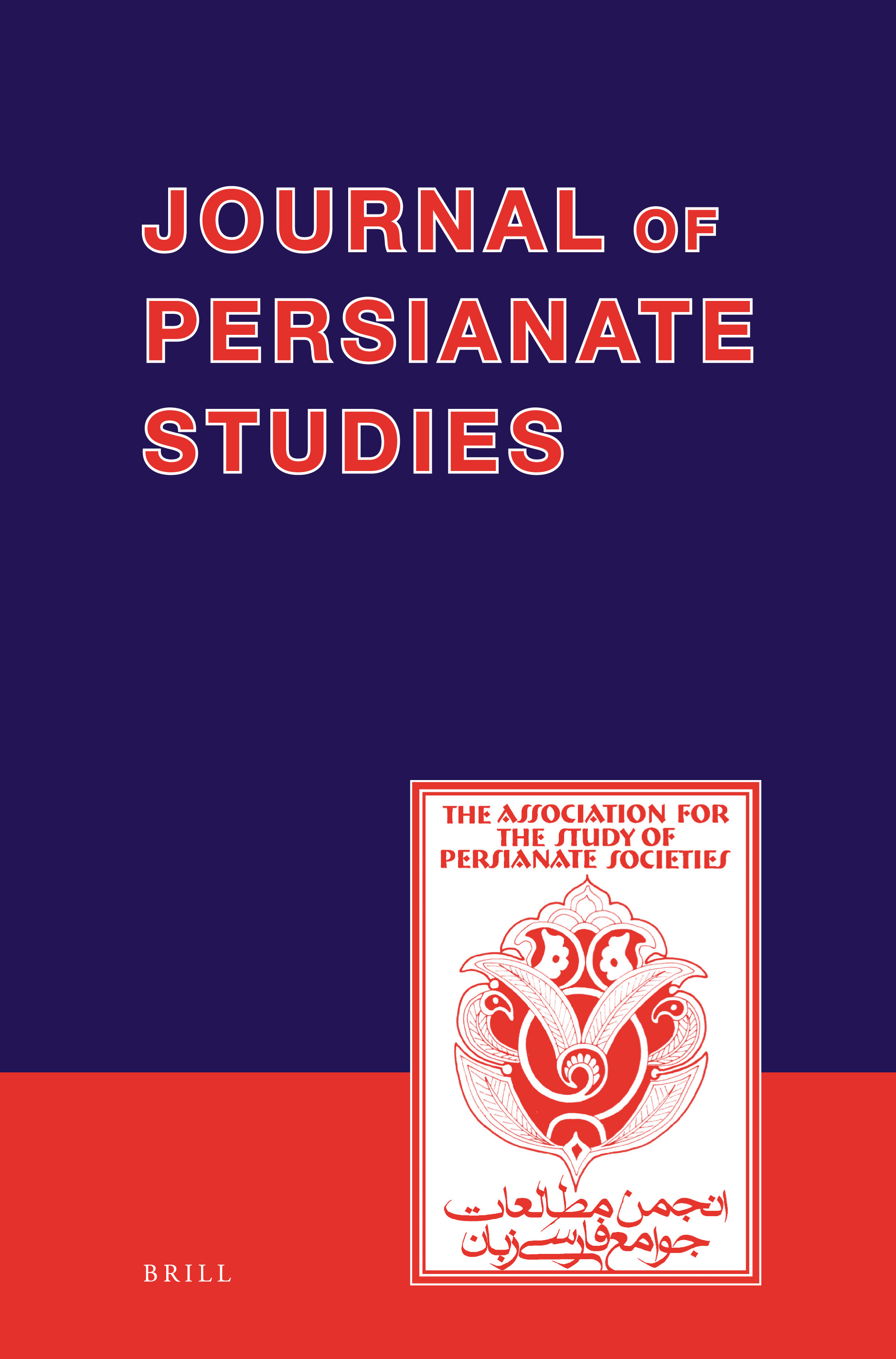Journal of Persianate Societies
he Association for the Study of Persianate Societies (ASPS) is a non-governmental, non-political, not-for-profit professional organisation for researchers and scholars interested in the culture and civilization of the Persian-speaking societies and related areas in the Iranian civilizational area. The Association supports the efforts of scholars around the world. It has brought some thirty visitors from Iran and Central Asia to take part in academic and cultural conferences and conventions since it began its Travel Fellowship Program in 1998. The Central Eurasia Research Fellowship provides funds for scholars from Central Asia. The Association also posts announcements of job openings and upcoming conferences relevant for its members.
The Association’s biennial conferences have been held in Bosnia-Herzegovina, India, Pakistan, Georgia and Armenia since its inauguration in Tajikistan in 2002; the latest shall be held in Istanbul in 2015. Eight regional branches give the ASPS an international presence. Together with Brill, it publishes the Journal of Persianate Studies, which features peer-reviewed articles on the culture and civilization of the geographical area where Persian has historically been the dominant language or a major cultural force, encompassing Iran, Afghanistan and Tajikistan, as well as the Caucasus, Central Asia, the Indian Subcontinent, and parts of the former Ottoman Empire. Its focus on the linguistic, cultural and historical role and influence of Persian culture and Iranian civilization in this area is based on a recognition that knowledge flows from pre-existing facts but is also constructed and thus helps shape the present reality of the Persianate world. Such knowledge can mitigate the leveling effects of globalization as well as counteract the distortions of the area’s common historical memory and civilizational continuity by the divisive forces of modern nationalism and imperialism.
VOLUMES & ISSUES
ISSUE ONE
Bankers and Politics: The Network of Shi‘i Moneychangers in Eighth-Ninth Century Kufa and their Role in the Shi‘i Community
Mushegh Asatryan
Illicit Acts and Sacred Space: Everyday Crime in the Shrine City of Mashhad, 1913-1914
Vejdani
The Shajara-ye Turk as an Important Source on the History of Relations between Khiva and Its Neighbors
Nigora Allaeva
Translation, Authority and Exegesis in Modern Iranian Sufism: Two Iranian Sufi Masters in Dialogue
Alessandro Cancian
Paradoxical Influence of the Islamicized School Education in Iran since the 1980s on Performance
Nathalie Matti
The Waziri Chain Shift
Corey Miller
Middle Persian abāz-handāxtan
Yusef Saadat
The Onion and the Mandrake: Plants in Yezidi Folk Beliefs
Victoria Arakelova
ISSUES ONE-TWO
Further Engaging the Paradigm of Late Antiquity
Parvaneh Pourshariati
The Ethics and Praxis of Mehr and Mithras and the Social Institution of the ʿayyārs in the Epic Romance of Samak-e ʿayyār
Parvaneh Pourshariati
Banners, Spears, Black Raiders and Byzantines: Some Textual Notes on Late Sasanian and post-Sasanian Zoroastrian Apocalyptic Texts
Dan D.Y. Shapira
“Building a New Vision of the Past in the Sasanian Empire: The Sanctuaries of Kayānsīh and the Great Fires of Iran”
Matthew P. Canepa
Marriage, Property and Conversion among the Zoroastrians: From Late Sasanian to Islamic Iran
Touraj Daryaee
Law in the Crisis of Empire: A Sasanian Example
Yaakov Elman
Late Antique Iran and the Arabs: The Case of al-Hira
Isabel Toral-Niehoff
Two Seal Impressions from Kāfer Qalʿa (Samarkand) and the Representations of Iranian Divinities
Matteo Compareti
R.R. Vasmer and His Hand-written Catalogue of Tabarestān Drachms
Konstantin V. Kravtsov
Early Persian Documents from Khorasan
Shaul Shaked
An Investigation into the Kurdish Genre of the Shāhnāma and Its Religious Dimensions
Behrooz Chamanara
Old Garment from a New Tailor: The Reception and Reshaping of Epic Material in Early Medieval Iran
Saghi Gazerani
Some Passages on Turkic Peoples in Zoroastrian Pahlavi Literature
Carlo G. Cereti
Whence Came the Asvārān? An Inquiry into the Ambiguity of Sources
Hossein Kamaly
Historiography and the Shoʿubiya Movement
Ghazzal Dabiri
The Iranian Time Reckoning and the Periodization of Iranian History into the ‘Pre Islamic’ and ‘Islamic’ Periods
Asef Kholdani
ISSUE ONE
The Conception of Revolution in Persianate Political Thought
Saïd Amir Arjomand
An Early Doctrinal Controversy in the Iranian School of Ismaʿili Thought and Its Implications
Ismail K. Poonawala
Persian Historical Documents of Georgia (Sixteenth to Eighteenth Centuries): Aspects of Linguistic Analysis
Helen Giunashvili and Tamar Abuladze
The Concept of Honor and its Reflection in the Iranian Penal Code
Irene Schneider
Recent Work on the History of Afghanistan
R. D. McChesney
ISSUE TWO
Islam and Constitutionalism in the Persianate World
Houchang E. Chehabi
The Ethical Literature: Religion and Political Authority as Brothers
Noah Feldman
The 1906-07 Iranian Constitution and the Constitutional Debate on Islam
Saïd Amir Arjomand
The Islamic Republic of Iran
H. E. Chehabi and Asghar Schirazi
Islam and Constitutionalism in Afghanistan
Amin Tarzi
Token Constitutionalism and Islamic Opposition in Tajikistan
Muriel Atkin
ISSUE ONE
Foreword
Alyssa Gabbay
Introduction
Julia Clancy-Smith
May You Learn from Their Model: The Exemplary Father-Daughter Relationship of Mohammad and Fatima in South Asian Shiism
Karen Ruffle
The Fatimid Caliph al-Aziz and His Daughter Sitt al-Mulk: A Case of Delayed but Eventual Succession to Rule by a Woman
Paul E. Walker
In Reality a Man: Sultan Iltutmish, His Daughter, Raziya, and Gender Ambiguity in Thirteenth Century Northern India
Alyssa Gabbay
Süleyman and Mihrimah: The Favorite’s Daughter
Christine Isom-Verhaaren
Imperial Transgressions and Spiritual Investitures: A Begam’s “Ascension” in Seventeenth Century Mughal India
Afshan Bokhari
ISSUE TWO
Introduction
Jo-Ann Gross
Shrine Traditions of Wakhan Afghanistan
John Mock
Open Access Ecology of Time: Calendar of the Human Body in the Pamir Mountains
Karim-Aly Kassam; Umed Bulbulshoev;Morgan Ruelle
Paving the Way: Ismaʿili Genealogy and Mobility along Tajikistan’s Pamir Highway
Till Mostowlansky
Potentially an “Art Object”: Tajik Ismaʿilis’ Bāteni and Zāheri Engagement with Their Imam’s Image
Aliaa Remtilla
The Genealogical History of the Last Royal Families of Chitral and Yasin: A Preliminary Study
Hidayat ur Rahman
“The Qebla of Jāmi is None Other than Tabriz”: ʿAbd al-Rahmān Jāmi and Naqshbandi Sufism at the Aq Qoyunlu Royal Court
Chad G. Lingwood
The Extinct Dialect of Tajrish: Caspian or Persian?
Habib Borjian
The Re-creation of a Middle Eastern Story in Latin America
Rahnaward Zaryab and Guilan Siassi
ISSUE ONE
A Garden of Possibilities in Manuchehri’s Spring Panegyrics
Jocelyn Sharlet
The History of Modernization of Law
Mohammad-Ali Forughi
Imagining Hāfez: Rabindranath Tagore in Iran, 1932
Afshin Marashi
Iranian Language Reform in the Twentieth Century:Did the First Farhangestān (1935-40) Succeed?
Ludwig Paul
A Survey of the Discipline of Political Science in Iran
Author: Maryam Rutner
ISSUE TWO
Through the Looking Glass: Kingly Virtues in Safavid and Mughal Historiography
Sholeh A. Quinn
Samarqand’s Rigestān and its Architectural Meanings
Sulhiniso Rahmatullaeva
A Picture Postcard View of the Persian Constitutional Revolution
Sassan Pejhan
A Syntacto-Cognitive Study of the Diachrony, Synchrony, Etymology and Gloss of the New Persian Formant am/an
Dariush Borbor
The Fall of the Sasanian Empire to the Arab Muslims: From Two Centuries of Silence to Decline and Fall of the Sasanian Empire: the Partho-Sasanian Confederacy and the Arab Conquest of Iran
Touraj Daryaee
A Survey of Russian Works on Persianate History and Culture, 2006-2010
Alexander V. Akopyan
ISSUE ONE
Georgia and Iran: Three Millennia of Cultural Relations An Overview
Fatema Soudavar Farmanfarmaian
Darius and the Bisotun Inscription: A New Interpretation of the Last Paragraph of Column IV
Hassan Rezai Baghbidi
Median Succumbs to Persian after Three Millennia of Coexistence: Language Shift in the Central Iranian Plateau
Habib Borjian
Persian Manuscripts: The Persianate Common Heritage of Iran with the Indian Subcontinent, Transoxiana and the Ottoman Empire
Akbar Irani
Survey of Russian Books on Iranian and Persianate Studies (2006-08)
Leila Dodykhudoeva and Bayandur Areg
ISSUE TWO
Evolution of the Persianate Polity and its Transmission to India
Saïd Amir Arjomand
The Georgian Translation of Vis and Rāmin: An Old Specimen of Hermeneutics
Inga Kaladze
Symposium on the Eighteenth-Century Fracturing of the Persianate World
Paul Losensky
From ‘Ā’esha to Nur Jahān: The Shaping of a Classical Persian Poetic Canon of Women
Sunil Sharma
Infantilizing Bābā Dārā: The Cultural Memory of Dārā Shekuh and the Mughal Public Sphere
Rajeev Kinra
Literary Connections: Bahār’s Sabkshenāsi and the Bāzgasht-e Adabi
Matthew C. Smith
Accounting for Difference: A Comparative Look at the Autobiographical Travel Narratives of Hazin Lāhiji and ‘Abd-al-Karim Kashmiri
Mana Kia
ISSUE ONE
From the Editor: Defining Persianate Studies
Saïd Amir Arjomand
The Salience of Political Ethic in the Spread of Persianate Islam
Saïd Amir Arjomand
To Forge a Book in the Medieval Ages: Nezām al-Molk’s Siyar al-Moluk (Siyāsat-Nāma)
Alexey A. Khismatulin
Central Organisation, Tabarrokāt and Succession among the Early Cheshtis in India
Ishtiaq Ahmad Zilli
Flowers of Persian Song and Music: Davud Pirniā and the Genesis of the Golhā Programs
Jane Lewisohn
Persian Rap: The Voice of Modern Iran’s Youth
Sholeh Johnston
ISSUE TWO
Social Movements in Near Eastern Cities from the 9th to the 13th Century
Valerian Gabashvili
An Historical Survey of Georgian–Iranian Relations in the Nineteenth Century
George Sanikidze
The Iranian Notion of xνar∂nah in Post-Achaemenid Georgian Kingship
Mariam Gvelesiani
Ancient and Historical Maps of Georgia and Persia
M. R. Sahab
Among the Chosen Cities: Tbilisi in the Shi’i Tradition
Grigol Beradze
Parsadan Gorgijanidze’s Exile in Shushtar: A Biographical Episode of a Georgian Official in the Service of the Safavids
Hirotake Maeda
Joseph Rousseau on Georgia and the Planned Indian Expedition (1807)
Irène Natchkebia
Two 18th-Century Royal Palaces in Georgia and Armenia
Irina Koshoridze
Two Chinese bowls from the Chini-khāna of Ardabil
Natia Rostiashvili
Persians in Georgia (1801-1921)
Marina Alexidze


